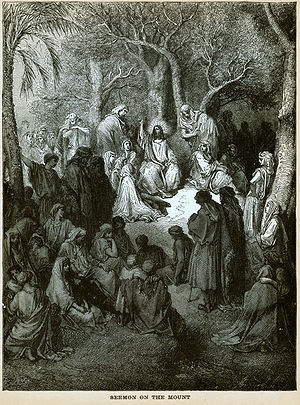 Image via WikipediaStep Eleven also calls us to meditation. If prayer is speaking to God, meditation is listening to God. This involves:
Image via WikipediaStep Eleven also calls us to meditation. If prayer is speaking to God, meditation is listening to God. This involves: Bible study.
The Bible is God's word. In it we find his will and his way, and we discover who he is. If we will let it, the Bible will function as a mirror for us, allowing us to see our behavior for what it is, and giving us a guide to evaluate what we are (or are not) doing.
Reflection.
This is a matter of listening. It will involve a quieting down, an offering of our life to God's control, a mulling over of issues, an alertness to new insights.
Meditation exercises.
There is no one way to meditate. Repeating the Jesus prayer ("Lord Jesus Christ, have mercy"), imagining that we are there during an event from the Bible (e.g., sitting at Jesus' feet and hearing him give the Sermon on the Mount), mulling over a phrase from Scripture (e.g., "My peace I give to you" John 14:27), reflecting on creation (e.g., letting the beauty of a flower draw us to God), or sitting in silence all qualify as meditation. Different people will find that certain styles of meditation suit them best.
Richard Foster writes: "Often meditation will yield insights that are deeply practical, almost mundane. Instruction will come on how to relate to your wife or husband, or how to deal with this sensitive problem or that business situation. It is wonderful when a particular meditation leads to ecstasy, but it far more common to be given guidance in dealing with ordinary human problems. Meditation sends us into our ordinary world with greater perspective and balance."
Prayer and meditation allow us to become better acquainted with the God to whom we have given our lives.
Witnessing
Step Twelve urges us to tell our story to others. This is, in fact, what takes place at Twelve Step meetings. Various people share publicly what has happened to them. often it is as a result of hearing the stories of others that people come to realize what is going on in their own lives, that they can get help with their problem, and that they need to take Step One. Thus they start on the road to recovery.
Telling our stories is called witnessing in the New Testament. This is how the church has spread throughout history: Christians tell others the story of Jesus and how they came to know him. Sharing with others about our addiction and how we have begun to recover from it gives us a natural opportunity to talk about God. After all, our recovery has its roots in the power of God and in coming to know God through Jesus Christ. In order to witness in this way, we will need to overcome our natural reticence to talk about faith issues. We do this when we come to realize how needy all people are. They may not necessarily be involved in addictive behavior, but they are still in need of God's love, forgiveness, and grace (because they, too, are human beings and are therefore sinful). You owe it to your friends to be open and candid about your spiritual journey.

No comments:
Post a Comment